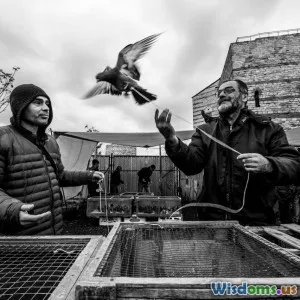
Legends as Tools for Personal Growth
7 min read Explore how timeless legends inspire personal growth and self-discovery through powerful myths and stories. (0 Reviews)
Legends as Tools for Personal Growth
"Stories are the communal currency of humanity." – Tahir Shah
Throughout history, legends have been more than mere narratives; they have served as mirrors reflecting the deepest truths of human nature and society. Far from obsolete myths of a bygone era, legends remain invaluable tools for personal growth, providing timeless lessons on courage, resilience, and transformation.
Introduction: Why Legends Matter Today
In an age dominated by rapid change and information overload, individuals often seek grounding wisdom to navigate their lives. Legends, born from the collective experiences and imagination of generations past, offer archetypal journeys that resonate on a personal level. They provide frameworks through which we identify our inner heroes and confront our challenges with renewed perspective.
Whether it's the heroic trials of King Arthur, the transformative odyssey of Odysseus, or the moral dilemmas faced by Anansi the Spider, these timeless stories give us context for our struggles and aspirations. By engaging with legends, we access symbolic languages that speak to our subconscious, facilitating growth beyond what explicit advice alone can achieve.
The Archetypal Power of Legends
Carl Jung, a pioneer in psychology, emphasized archetypes—universal, symbolic patterns within legends and myths. These archetypes play a crucial role in personal growth:
-
The Hero's Journey: Popularized by Joseph Campbell, this archetype encapsulates a transformational path from innocence to maturity through trials and setbacks, encouraging perseverance and self-discovery.
-
The Shadow: Representing our darker or repressed aspects, legends challenge us to confront these shadows, fostering acceptance and balance.
-
The Mentor: Figures like Merlin or Athena symbolize wisdom and guidance, reminding us to seek support and cultivate knowledge.
Engaging with these archetypes enables individuals to map their psychological development, confronting internal conflicts and recognizing personal strengths.
Lessons from Legendary Narratives: Real-World Applications
Resilience Through Trials
Consider the Greek hero Heracles, whose twelve labors epitomize overcoming seemingly insurmountable challenges. These tales teach us that hardship is an essential catalyst for growth. Modern psychology echoes this: research in positive psychology identifies "post-traumatic growth"—where adversity leads to newfound strengths and insights.
For example, Heracles’ relentless determination encourages us to reframe difficulties as growth opportunities rather than obstacles, promoting resilience in daily life.
Self-Discovery and Identity
The myth of the Phoenix, rising from its ashes, symbolizes rebirth and transformation. People facing life transitions or seeking reinvention often draw inspiration from this legend to embrace change rather than fear it.
Legends help us understand that identity isn’t static; like the Phoenix, we can continually renew ourselves. This perspective aligns with modern therapeutic approaches emphasizing narrative identity—the stories we construct about ourselves profoundly shape our mental well-being.
Ethical and Moral Growth
The Norse myths, especially those concerning gods like Odin, reveal complex moral landscapes where decisions carry significant consequences, reflecting life's ethical ambiguity.
These narratives prompt introspection on values and ethics. For instance, Odin’s quest for wisdom—sacrificing an eye—teaches the importance of prioritizing long-term insight over immediate gratification, relevant in leadership and personal decision-making.
Cultivating Inner Strength: Legends as Practical Tools
Visualization and Guided Reflection
Psychologists find that guided visualization, inspired by legendary scenarios, can foster coping skills and emotional regulation. For example, envisioning oneself as a legendary hero overcoming adversity might bolster confidence before challenging tasks.
Storytelling Journals
By rewriting or personalizing legends to reflect one’s own experiences, individuals engage in transformative storytelling that strengthens self-awareness. This technique encourages reframing narratives of failure into stories of potential and hope.
Group Discussions and Workshops
Communities using legends as focal points for dialogue often report increased empathy and insight. Educational settings integrating mythological stories into curricula see improved critical thinking and emotional intelligence.
Legends in Contemporary Personal Growth Movements
The resurgence of ancient stories in modern coaching, therapy, and self-help demonstrates their enduring relevance. Workshops on "Hero’s Journey" principles or mindfulness programs incorporating mythic metaphors highlight practical applications.
Furthermore, diverse cultures contribute a rich tapestry of legends, fostering inclusive approaches to growth. For example, African folklore featuring Anansi teaches cleverness and adaptability, skills critical in today’s dynamic world.
Conclusion: Embracing Legends as Lifelong Guides
Legends are far more than relics of the past; they are living, breathing frameworks that continue to illuminate pathways toward personal growth. By tapping into archetypal stories filled with wisdom, we can transform challenges into opportunities, cultivate resilience, and deepen self-understanding.
To integrate the power of legends into your life, begin by exploring stories from varied cultures and reflecting on the archetypes they reveal. Engage actively with these tales—through reading, visualization, or conversation—and allow their timeless messages to inspire your own journey toward wholeness and growth.
"The cave you fear to enter holds the treasure you seek." – Joseph Campbell
Let the legends be your guide through the caves and peaks of personal transformation.
Rate the Post
User Reviews
Popular Posts



















